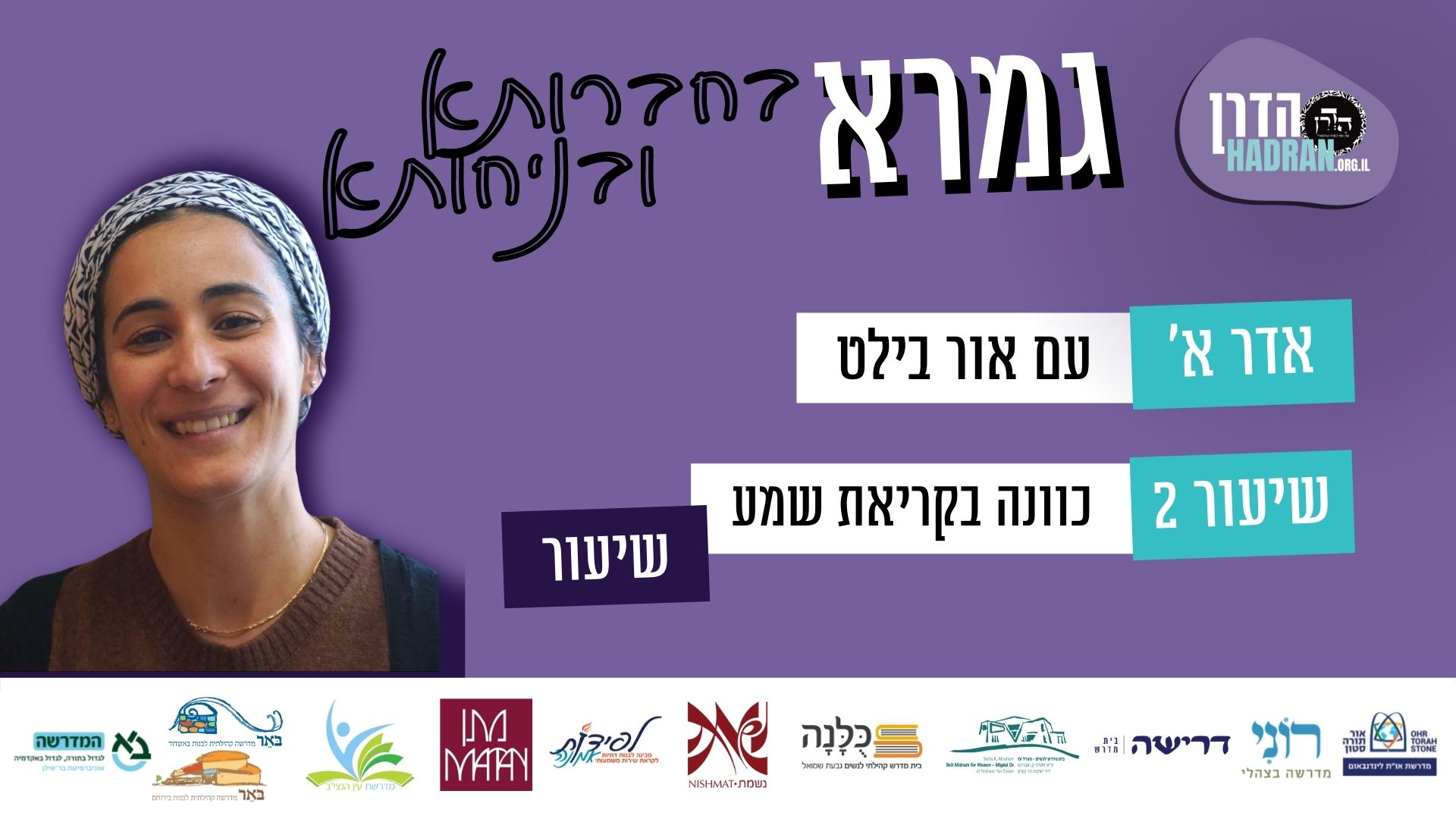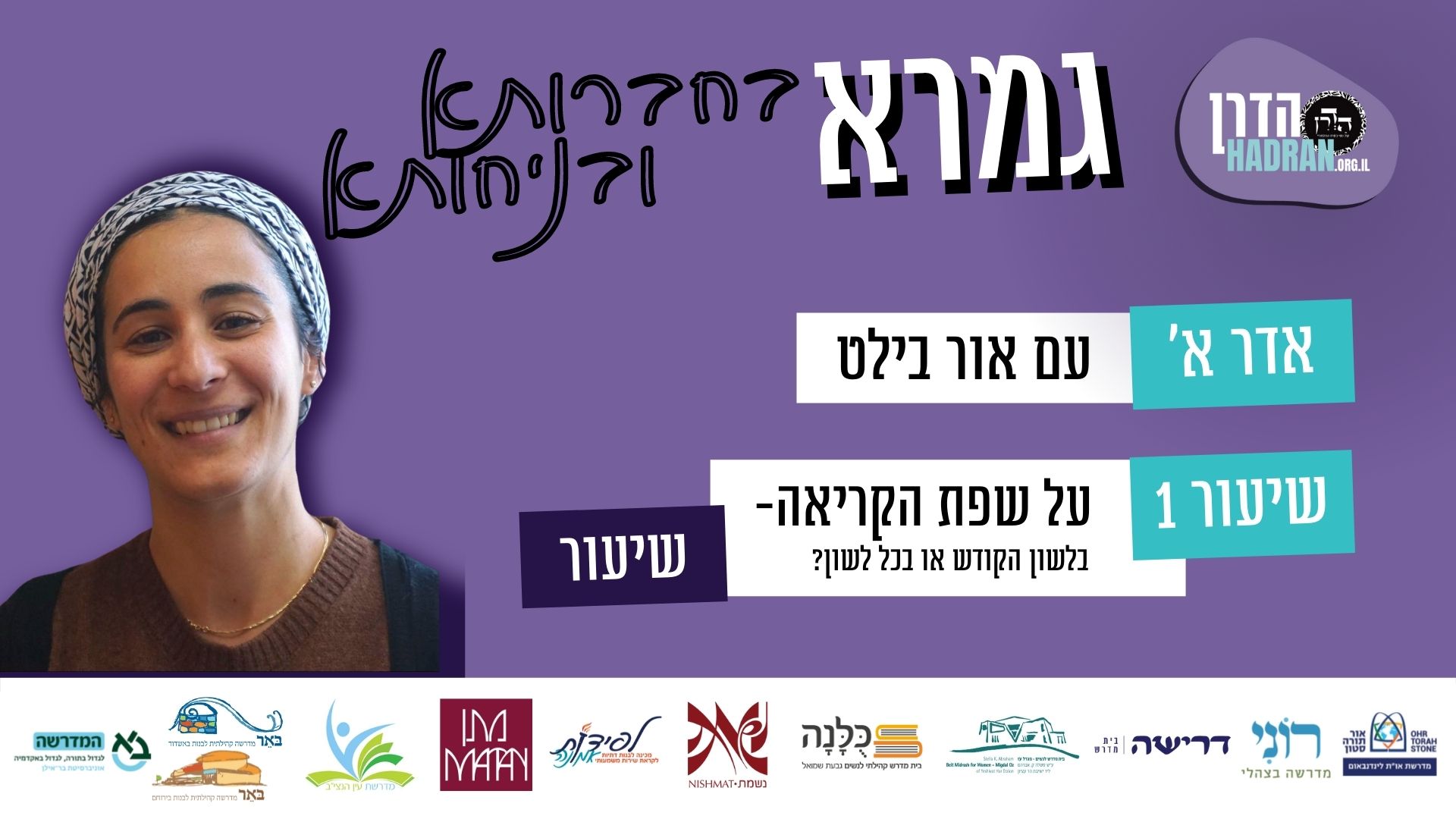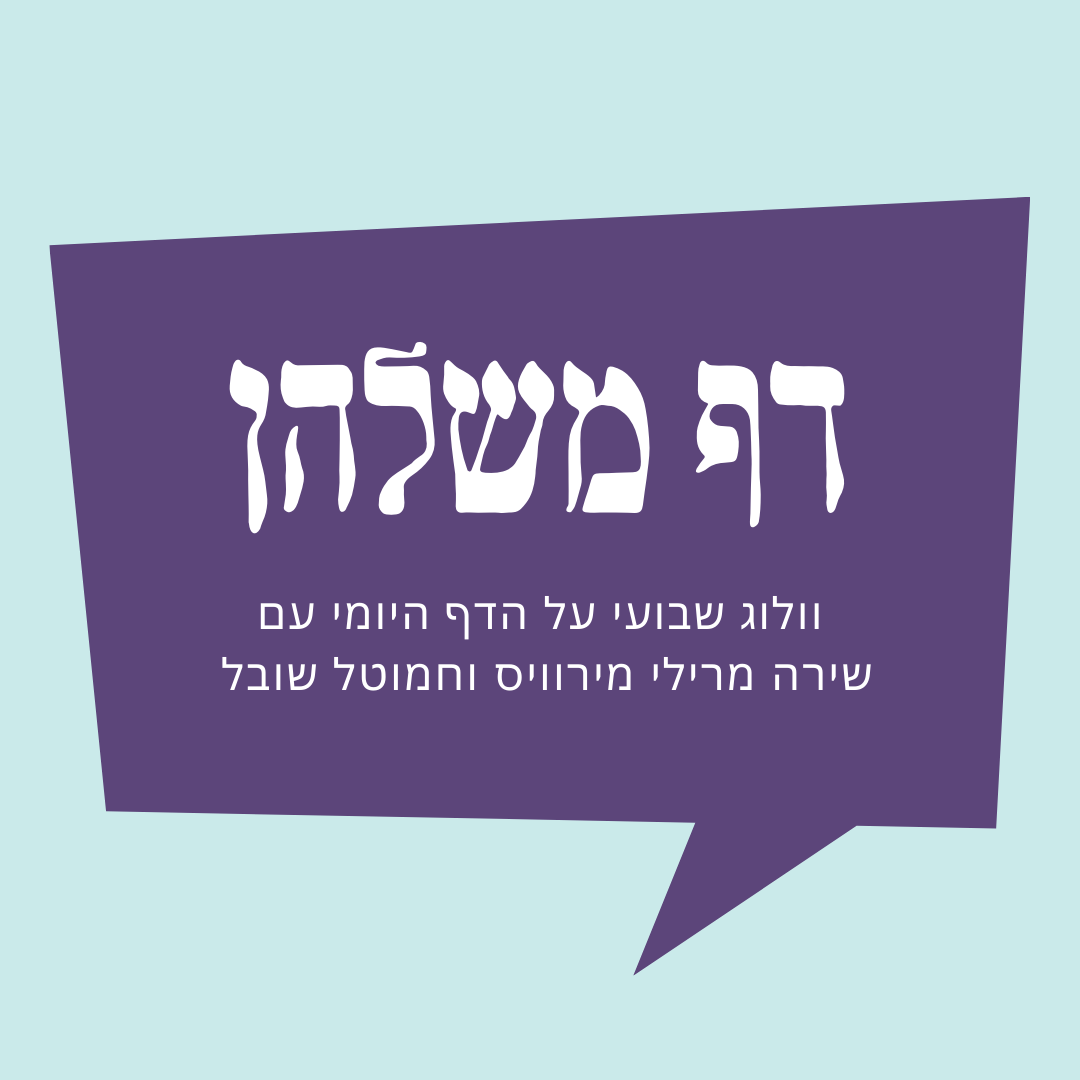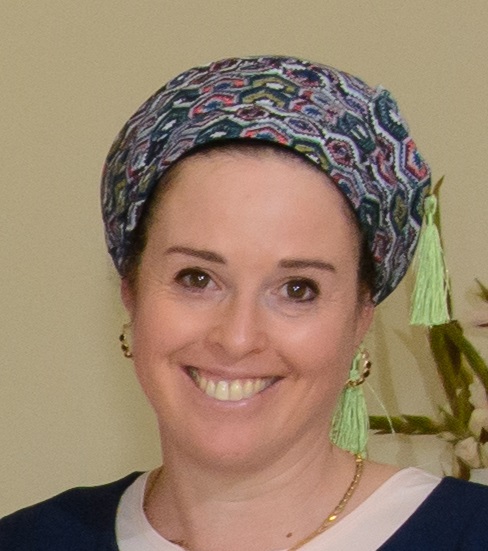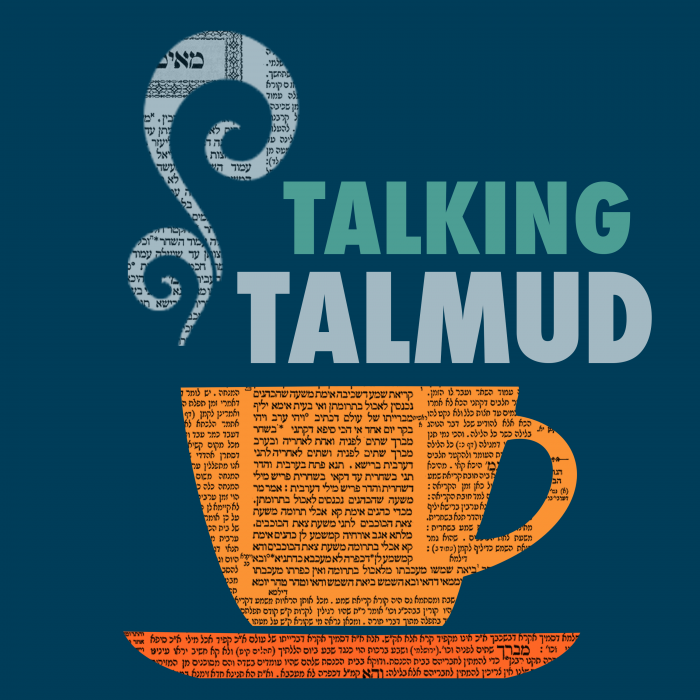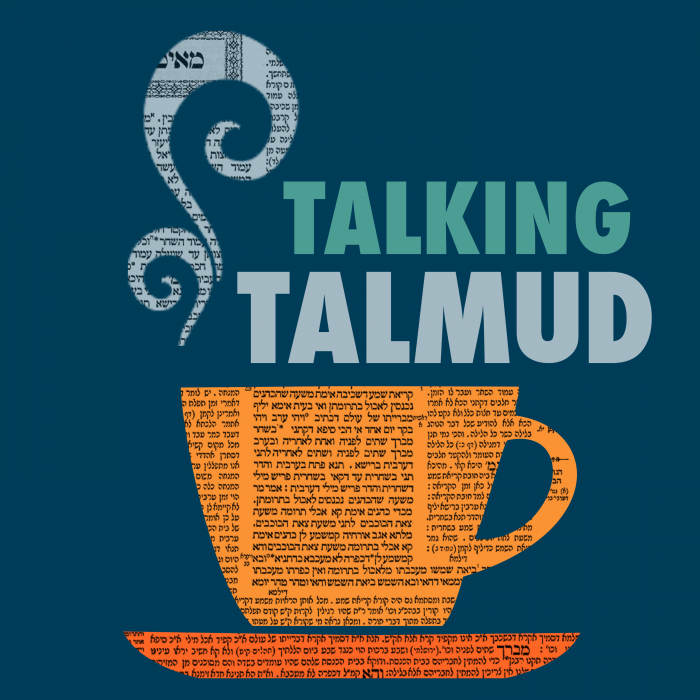ברכות מח
לְאֵתוּיֵי קָטָן פּוֹרֵחַ?
to include a mature minor? Explain the baraita as follows: A minor who grew two hairs is included in a zimmun, and we are not exacting with regard to a minor to ascertain whether or not he has reached the age of majority.
וְלֵית הִלְכְתָא כְּכׇל הָנֵי שְׁמַעְתָּתָא, אֶלָּא כִּי הָא דְּאָמַר רַב נַחְמָן: קָטָן הַיּוֹדֵעַ לְמִי מְבָרְכִין — מְזַמְּנִין עָלָיו.
The Gemara concludes: The halakha is not in accordance with all of these statements. Rather, the halakha is in accordance with this statement that Rav Naḥman said: A minor who knows to Whom one recites a blessing is included in a zimmun.
אַבָּיֵי וְרָבָא הֲווֹ יָתְבִי קַמֵּיהּ דְּרַבָּה. אֲמַר לְהוּ רַבָּה: לְמִי מְבָרְכִין? אָמְרִי לֵיהּ: לְרַחֲמָנָא. וְרַחֲמָנָא הֵיכָא יָתֵיב? — רָבָא אַחְוִי לִשְׁמֵי טְלָלָא. אַבָּיֵי נְפַק לְבַרָּא, אַחְוִי כְּלַפֵּי שְׁמַיָּא. אֲמַר לְהוּ רַבָּה: תַּרְוַיְיכוּ רַבָּנַן הָוֵיתוּ. הַיְינוּ דְּאָמְרִי אִינָשֵׁי: בּוּצִין בּוּצִין מִקִּטְפֵיהּ יְדִיעַ.
The Gemara relates that Abaye and Rava, when they were children, were seated before Rabba. Rabba said to them: To whom does one recite blessings? They said to him: To God, the All-Merciful. Rabba asked them: And where does the All-Merciful reside? Rava pointed to the ceiling. Abaye went outside and pointed toward the heaven. Rabba said to them: You will both become Sages. It is as the popular saying goes: A cucumber can be recognized from its blossoming stage. Similarly, a great person can be recognized even from a young age.
אָמַר רַב יְהוּדָה בְּרֵיהּ דְּרַב שְׁמוּאֵל בַּר שִׁילַת מִשְּׁמֵיהּ דְּרַב: תִּשְׁעָה אָכְלוּ דָּגָן וְאֶחָד אָכַל יָרָק — מִצְטָרְפִין. אָמַר רַבִּי זֵירָא: בְּעַאי מִינֵּיהּ מֵרַב יְהוּדָה: שְׁמֹנָה מַהוּ? שִׁבְעָה מַהוּ? אָמַר לִי: לָא שְׁנָא. שִׁשָּׁה וַדַּאי לָא מִבַּעְיָא לִי. אָמַר לֵיהּ רַבִּי יִרְמְיָה: שַׁפִּיר עֲבַדְתְּ דְּלָא אִיבַּעְיָא לְךָ, הָתָם טַעְמָא מַאי — מִשּׁוּם דְּאִיכָּא רוּבָּא, הָכָא נָמֵי אִיכָּא רוּבָּא. וְאִיהוּ סָבַר רוּבָּא דְמִינְּכַר בָּעֵינַן.
Rav Yehuda, son of Rav Shmuel bar Sheilat, said in the name of Rav: If nine ate grain and one ate vegetables, they join and form a zimmun of ten. Rabbi Zeira said: I raised a dilemma before Rav Yehuda: What is the ruling if eight ate grain and two ate vegetables? May they join together? What is the ruling if seven ate grain? He said to me: There is no difference. I certainly had no dilemma with regard to six, as it was clear to me that six are insufficient to warrant a zimmun. Rabbi Yirmeya said to him: You did well that you had no dilemma with regard to six, but for the opposite reason. There, in the case of seven or eight, what is the reason that they form a zimmun of ten? Because there is a majority of those dining who ate grain. Here, too, there is a majority. Rabbi Zeira, however, held: We require an obvious majority. Therefore, contrary to the opinion of Rabbi Yirmeya, it was clear to him that six who ate grain are insufficient to form a zimmun.
יַנַּאי מַלְכָּא וּמַלְכְּתָא כְּרִיכוּ רִיפְתָּא בַּהֲדֵי הֲדָדֵי, וּמִדִּקְטַל לְהוּ לְרַבָּנַן לָא הֲוָה לֵיהּ אִינִישׁ לְבָרוֹכֵי לְהוּ. אֲמַר לַהּ לִדְבֵיתְהוּ: מַאן יָהֵיב לַן גַּבְרָא דִּמְבָרֵךְ לַן? אֲמַרָה לֵיהּ: אִשְׁתְּבַע לִי דְּאִי מַיְיתֵינָא לָךְ גַּבְרָא דְּלָא מְצַעֲרַתְּ לֵיהּ. אִשְׁתְּבַע לַהּ. אַיְיתִיתֵיהּ לְשִׁמְעוֹן בֶּן שָׁטַח אֲחוּהָ. אוֹתְבֵיהּ בֵּין דִּידֵיהּ לְדִידַהּ. אֲמַר לֵיהּ: חָזֵית כַּמָּה יְקָרָא עָבֵידְנָא לָךְ. אָמַר לֵיהּ: לָאו אַתְּ קָא מוֹקְרַתְּ לִי אֶלָּא אוֹרָיְיתָא הִיא דְּמוֹקְרָא לִי, דִּכְתִיב: ״סַלְסְלֶהָ וּתְרוֹמְמֶךָּ תְּכַבֵּדְךָ כִּי תְחַבְּקֶנָּה״. אֲמַר לַהּ: קָא חָזֵית דְּלָא מְקַבֵּל מָרוּת.
The Gemara relates: King Yannai and the queen ate bread together. And since Yannai executed the Sages, there was no one to recite the Grace after Meals blessing on their behalf. He said to his wife: Who will provide us with a man to recite the blessing on our behalf? She said to him: Swear to me that if I bring you such a man, you will not harass him. He swore, and she brought her brother, Shimon ben Shataḥ. She sat him between the King’s throne and hers. The King said to him: Do you see how much honor I am according you? He responded: It is not you who honors me; rather, the Torah honors me, as it is written: “Extol her and she will exalt you; she will bring you to honor when you embrace her” (Proverbs 4:8). Yannai said to his wife: You see that he does not accept authority.
יְהַבוּ לֵיהּ כָּסָא לְבָרוֹכֵי. אֲמַר: הֵיכִי אֲבָרֵיךְ — ״בָּרוּךְ שֶׁאָכַל יַנַּאי וַחֲבֵירָיו מִשֶּׁלּוֹ״? שַׁתְיֵיהּ לְהָהוּא כָּסָא, יְהַבוּ לֵיהּ כָּסָא אַחֲרִינָא וּבָרֵיךְ.
They gave Shimon ben Shataḥ a cup of wine over which to recite Grace after Meals. He said: How shall I recite the blessing? Shall I say: Blessed is He from Whom Yannai and his companions have eaten? I have not eaten anything. He drank that cup of wine. They gave him another cup, and he recited the Grace after Meals blessing. By drinking the first cup he joined the other diners and was therefore eligible to recite Grace after Meals on their behalf.
אָמַר רַבִּי אַבָּא בְּרֵיהּ דְּרַבִּי חִיָּיא בַּר אַבָּא אָמַר רַבִּי יוֹחָנָן: שִׁמְעוֹן בֶּן שָׁטַח דַּעֲבַד — לְגַרְמֵיהּ הוּא דַּעֲבַד, דְּהָכִי אָמַר רַבִּי חִיָּיא בַּר אַבָּא אָמַר רַבִּי יוֹחָנָן: לְעוֹלָם אֵינוֹ מוֹצִיא אֶת הָרַבִּים יְדֵי חוֹבָתָן עַד שֶׁיֹּאכַל כְּזַיִת דָּגָן.
With regard to this story, Rabbi Abba, son of Rabbi Ḥiyya bar Abba, said (that Rabbi Yoḥanan said): That which Shimon ben Shataḥ did, reciting Grace after Meals on their behalf, he did on his own, and not in accordance with the accepted halakha, as Rabbi Ḥiyya bar Abba said that Rabbi Yoḥanan said as follows: One who recites Grace after Meals cannot fulfill the obligation of others to recite it until he eats an olive-bulk of grain.
מֵיתִיבִי, רַבָּן שִׁמְעוֹן בֶּן גַּמְלִיאֵל אוֹמֵר: עָלָה וְהֵסֵיב עִמָּהֶם אֲפִילּוּ לֹא טִבֵּל עִמָּהֶם אֶלָּא בְּצִיר, וְלֹא אָכַל עִמָּהֶם אֶלָּא גְּרוֹגֶרֶת אַחַת — מִצְטָרֵף.
The Gemara raises an objection based on what was taught in a baraita: Rabban Shimon ben Gamliel says: One who entered and reclined together with those who were dining, even if he only dipped with them a small bit of food in spicy brine that was before them and ate with them only a single dry fig, he joins them. This baraita demonstrates that one need not necessarily eat grain to recite Grace after Meals on their behalf.
אִיצְטְרוֹפֵי מִצְטָרֵף אֲבָל לְהוֹצִיא אֶת הָרַבִּים יְדֵי חוֹבָתָן — עַד שֶׁיֹּאכַל כְּזַיִת דָּגָן.
The Gemara responds: Indeed, he joins them, but he cannot satisfy the obligation of the many unless he has eaten an olive-bulk of grain.
אִיתְּמַר נָמֵי, אָמַר רַב חָנָא בַּר יְהוּדָה מִשְּׁמֵיהּ דְּרָבָא: אֲפִילּוּ לֹא
Similarly, this halakha was also stated: Rav Ḥana bar Yehuda said in the name of Rava: Even if he only
טִבֵּל עִמָּהֶם אֶלָּא בְּצִיר, וְלֹא אָכַל עִמָּהֶם אֶלָּא גְּרוֹגֶרֶת אַחַת — מִצְטָרֵף. וּלְהוֹצִיא אֶת הָרַבִּים יְדֵי חוֹבָתָם — אֵינוֹ מוֹצִיא עַד שֶׁיֹּאכַל כְּזַיִת דָּגָן. אָמַר רַב חָנָא בַּר יְהוּדָה מִשְּׁמֵיהּ דְּרָבָא: הִלְכְתָא, אָכַל עֲלֵה יָרָק וְשָׁתָה כּוֹס שֶׁל יַיִן — מִצְטָרֵף. לְהוֹצִיא — אֵינוֹ מוֹצִיא עַד שֶׁיֹּאכַל כְּזַיִת דָּגָן.
dipped with them a small bit of food in brine and ate with them only a single dry fig, he joins them. And to satisfy the obligation of the many, he does not satisfy their obligation until he eats an olive-bulk of grain. Rabbi Ḥana bar Yehuda said in the name of Rava that the halakha is: If one ate a vegetable leaf and drank a cup of wine, he joins the diners. However, to satisfy the obligation of others, he does not satisfy their obligation until he eats an olive-bulk of grain.
אָמַר רַב נַחְמָן: מֹשֶׁה תִּקֵּן לְיִשְׂרָאֵל בִּרְכַּת ״הַזָּן״ בְּשָׁעָה שֶׁיָּרַד לָהֶם מָן. יְהוֹשֻׁעַ תִּקֵּן לָהֶם בִּרְכַּת הָאָרֶץ כֵּיוָן שֶׁנִּכְנְסוּ לָאָרֶץ. דָּוִד וּשְׁלֹמֹה תִּקְּנוּ ״בּוֹנֵה יְרוּשָׁלַיִם״. דָּוִד תִּקֵּן ״עַל יִשְׂרָאֵל עַמֶּךָ וְעַל יְרוּשָׁלַיִם עִירֶךָ״, וּשְׁלֹמֹה תִּקֵּן ״עַל הַבַּיִת הַגָּדוֹל וְהַקָּדוֹשׁ״. ״הַטּוֹב וְהַמֵּטִיב״ בְּיַבְנֶה תִּקְּנוּהָ כְּנֶגֶד הֲרוּגֵי בֵּיתָר. דְּאָמַר רַב מַתְנָא: אוֹתוֹ הַיּוֹם שֶׁנִּיתְּנוּ הֲרוּגֵי בֵּיתָר לִקְבוּרָה תִּקְנוּ בְּיַבְנֶה ״הַטּוֹב וְהַמֵּטִיב״. ״הַטּוֹב״ — שֶׁלֹּא הִסְרִיחוּ, ״וְהַמֵּטִיב״ — שֶׁנִּיתְּנוּ לִקְבוּרָה.
With regard to the origins of the four blessings of Grace after Meals, Rav Naḥman said:
Moses instituted for Israel the first blessing of: Who feeds all, when the manna descended for them and they needed to thank God.
Joshua instituted the blessing of the land when they entered Eretz Yisrael.
David and Solomon instituted the third blessing: Who builds Jerusalem, in the following manner:
David instituted “…on Israel Your people and on Jerusalem Your city…” as he conquered the city,
and Solomon instituted “…on the great and Holy Temple…” as he was the one who built the Temple.
They instituted the blessing: Who is good and does good, at Yavne in reference to the slain Jews of the city of Beitar at the culmination of the bar Kokheva rebellion. They were ultimately brought to burial after a period during which Hadrian refused to permit their burial. As Rav Mattana said: On the same day that the slain of Beitar were brought to burial, they instituted the blessing: Who is good and does good, at Yavne. Who is good, thanking God that the corpses did not decompose while awaiting burial, and does good, thanking God that they were ultimately brought to burial.
תָּנוּ רַבָּנַן, סֵדֶר בִּרְכַּת הַמָּזוֹן כָּךְ הִיא: בְּרָכָה רִאשׁוֹנָה — בִּרְכַּת ״הַזָּן״, שְׁנִיָּה — בִּרְכַּת הָאָרֶץ, שְׁלִישִׁית — ״בּוֹנֵה יְרוּשָׁלַיִם״, רְבִיעִית — ״הַטּוֹב וְהַמֵּטִיב״, וּבְשַׁבָּת — מַתְחִיל בְּנֶחָמָה וּמְסַיֵּים בְּנֶחָמָה, וְאוֹמֵר קְדוּשַּׁת הַיּוֹם בָּאֶמְצַע. רַבִּי אֱלִיעֶזֶר אוֹמֵר: רָצָה לְאוֹמְרָהּ בַּנֶּחָמָה — אוֹמְרָהּ, בְּבִרְכַּת הָאָרֶץ — אוֹמְרָהּ, בִּבְרָכָה שֶׁתִּקְּנוּ חֲכָמִים בְּיַבְנֶה — אוֹמְרָהּ. וַחֲכָמִים אוֹמְרִים: אֵינוֹ אוֹמְרָהּ אֶלָּא בַּנֶּחָמָה בִּלְבַד.
On the topic of the blessings of Grace after Meals, the Gemara adds that the Sages taught in a baraita that the order of Grace after Meals is as follows: The first blessing is the blessing of: Who feeds all; the second is the blessing of the land; the third is: Who builds Jerusalem; and the fourth is: Who is good and does good. On Shabbat one begins the third blessing with consolation and ends with consolation and mentions the sanctity of the day with mention of Shabbat in the middle. Rabbi Eliezer says: If one wishes to recite the supplement for the sanctity of Shabbat in the blessing of consolation: Who builds Jerusalem, he recites it there; in the blessing of the land, he recites it there; in the blessing instituted by the Sages at Yavne, Who is good and does good, he recites it there. And the Rabbis say: He may only recite the mention of the sanctity of Shabbat in the context of the blessing of consolation.
חֲכָמִים הַיְינוּ תַּנָּא קַמָּא? — אִיכָּא בֵּינַיְיהוּ דִּיעֲבַד.
The Gemara remarks: The opinion of the Rabbis is identical with the opinion of the first tanna. Both opinions hold that the mention of Shabbat is in the third blessing. The Gemara responds: The difference between the opinion of the Rabbis and the opinion of the first tanna is with regard to after the fact. They both agree that ab initio, Shabbat should be mentioned in the third blessing. If, though, one inadvertently mentioned Shabbat in one of the other blessings mentioned by Rabbi Eliezer, the first tanna holds that he fulfilled his obligation and the Rabbis emphasize that it may only be recited in the blessing of consolation.
תָּנוּ רַבָּנַן: מִנַּיִן לְבִרְכַּת הַמָּזוֹן מִן הַתּוֹרָה? — שֶׁנֶּאֱמַר: ״וְאָכַלְתָּ וְשָׂבָעְתָּ וּבֵרַכְתָּ״ — זוֹ בִּרְכַּת ״הַזָּן״, ״אֶת ה׳ אֱלֹהֶיךָ״ — זוֹ בִּרְכַּת הַזִּמּוּן, ״עַל הָאָרֶץ״ — זוֹ בִּרְכַּת הָאָרֶץ, ״הַטּוֹבָה״ — זוֹ ״בּוֹנֵה יְרוּשָׁלַיִם״, וְכֵן הוּא אוֹמֵר ״הָהָר הַטּוֹב הַזֶּה וְהַלְּבָנוֹן״. ״אֲשֶׁר נָתַן לָךְ״ — זוֹ ״הַטּוֹב וְהַמֵּטִיב״. אֵין לִי אֶלָּא לְאַחֲרָיו, לְפָנָיו מִנַּיִן? — אָמְרַתְּ קַל וָחוֹמֶר: כְּשֶׁהוּא שָׂבֵעַ מְבָרֵךְ, כְּשֶׁהוּא רָעֵב — לֹא כׇּל שֶׁכֵּן.
The Sages taught in a Tosefta: From where is it derived that Grace after Meals is from the Torah? As it is stated: “And you shall eat and be satisfied, and you shall bless the Lord, your God, for the good land that He has given you” (Deuteronomy 8:10). The Gemara explains: And you shall bless, that is the blessing of: Who feeds all. The Lord, your God, that is the zimmun blessing in which God’s name is invoked. For the land, that is the blessing of the land; good, that is the blessing: Who builds Jerusalem, and it also says: “This good mountain and Lebanon” (Deuteronomy 3:25), which is interpreted homiletically as referring to Jerusalem and the Temple. That He gave you, that is: Who is good and does good. However, I only have a Torah source for blessings after eating, i.e., Grace after Meals. From where is it derived that one is obligated to recite blessings before eating? You said that it can be derived through an a fortiori inference: When one is satisfied, he is obligated to recite a blessing and thank God for food; when he is hungry, all the more so that he should recite a blessing to offer thanks for the food he will eat.
רַבִּי אוֹמֵר [אֵינוֹ צָרִיךְ]: ״וְאָכַלְתָּ וְשָׂבָעְתָּ וּבֵרַכְתָּ״ — זוֹ בִּרְכַּת הַזָּן, אֲבָל בִּרְכַּת הַזִּמּוּן מִ״גַּדְּלוּ לַה׳ אִתִּי״ נָפְקָא. ״עַל הָאָרֶץ״ — זוֹ בִּרְכַּת הָאָרֶץ, ״הַטּוֹבָה״ — זוֹ ״בּוֹנֵה יְרוּשָׁלַיִם״, וְכֵן הוּא אוֹמֵר ״הָהָר הַטּוֹב הַזֶּה וְהַלְּבָנוֹן״. ״הַטּוֹב וְהַמֵּטִיב״ בְּיַבְנֶה תִּקְּנוּהָ. אֵין לִי אֶלָּא לְאַחֲרָיו, לְפָנָיו מִנַּיִן? תַּלְמוּד לוֹמַר: ״אֲשֶׁר נָתַן לָךְ״ — מִשֶּׁנָּתַן לָךְ.
Rabbi Yehuda HaNasi says: It is not necessary to interpret the verse this way; rather, it should be understood in a slightly different manner, as follows: “And you shall eat and be satisfied, and you shall bless,” that is the blessing of: Who feeds all; however, the zimmun blessing is derived from the verse: “Praise God with me and we will exalt His name together” (Psalms 34:3). He continues: For the land, that is the blessing of the land. Good, that is the blessing: Who builds Jerusalem, and it also says: This good mountain and Lebanon. They instituted the blessing: Who is good and does good, at Yavne and, as such, it has no biblical source. However, I only have a Torah source for blessings after eating, i.e., Grace after Meals. From where is it derived that one is obligated to recite blessings before eating? The verse states: That he gave you. A blessing must be recited over food from the moment that God gave it to you, not only afterward.
רַבִּי יִצְחָק אוֹמֵר: אֵינוֹ צָרִיךְ, הֲרֵי הוּא אוֹמֵר ״וּבֵרַךְ אֶת לַחְמְךָ וְאֶת מֵימֶיךָ״, אַל תִּקְרֵי ״וּבֵרַךְ״ אֶלָּא ״וּבָרֵךְ״. וְאֵימָתַי קָרוּי ״לֶחֶם״ — קוֹדֶם שֶׁיֹּאכְלֶנּוּ.
Rabbi Yitzḥak says: That source for the obligation to recite a blessing beforehand is not necessary, as it says: “And He will bless your bread and your water” (Exodus 23:25); do not read: And He will bless [uveirakh], rather: And you will bless [uvareikh]. And when is it called bread? Before it is eaten.
רַבִּי נָתָן אוֹמֵר: אֵינוֹ צָרִיךְ, הֲרֵי הוּא אוֹמֵר ״כְּבֹאֲכֶם הָעִיר כֵּן תִּמְצְאוּן אוֹתוֹ בְּטֶרֶם יַעֲלֶה הַבָּמָתָה לֶאֱכוֹל כִּי לֹא יֹאכַל הָעָם עַד בֹּאוֹ כִּי הוּא יְבָרֵךְ הַזֶּבַח אַחֲרֵי כֵן יֹאכְלוּ הַקְּרֻאִים״.
Rabbi Natan says: That source for the obligation to recite a blessing beforehand is not necessary, as it says when the maidens told Saul: “As soon you come into the city, find him right away, before he goes up to the high place to eat; for the people will not eat until he comes, because he will bless the sacrifice; and afterwards all those who are invited will eat; now go, for you shall find him at this time of day” (I Samuel 9:13). A blessing recited prior to eating is explicitly mentioned in that verse.
וְכׇל כָּךְ לָמָּה? לְפִי שֶׁהַנָּשִׁים דַּבְּרָנִיּוֹת הֵן. וּשְׁמוּאֵל אָמַר: כְּדֵי לְהִסְתַּכֵּל בְּיׇפְיוֹ שֶׁל שָׁאוּל, דִּכְתִיב: ״מִשִּׁכְמוֹ וָמַעְלָה גָּבֹהַּ מִכׇּל הָעָם״. וְרַבִּי יוֹחָנָן אָמַר: לְפִי שֶׁאֵין מַלְכוּת נוֹגַעַת בַּחֲבֶרְתָּהּ אֲפִילּוּ כִּמְלֹא נִימָא.
Tangentially, the Gemara asks: Why did these maidens go on so expansively while speaking to Saul? It is because women are chatterers. And Shmuel said a different reason: They spoke expansively in order to gaze upon Saul’s beauty longer, as it is written about him: “An excellent young man; no one among the Israelites was better than he; he was taller than the people from the shoulders up” (I Samuel 9:2). Rabbi Yoḥanan said that their expansiveness was initiated by God, because one sovereignty does not overlap with its counterpart, even one hairbreadth. Saul’s coronation was delayed so that Samuel’s leadership would not be curtailed.
וְאֵין לִי אֶלָּא בִּרְכַּת הַמָּזוֹן. בִּרְכַּת הַתּוֹרָה מִנַּיִן? אָמַר רַבִּי יִשְׁמָעֵאל: קַל וָחוֹמֶר, עַל חַיֵּי שָׁעָה מְבָרֵךְ, עַל חַיֵּי עוֹלָם הַבָּא לֹא כׇּל שֶׁכֵּן. רַבִּי חִיָּיא בַּר נַחְמָנִי תַּלְמִידוֹ שֶׁל רַבִּי יִשְׁמָעֵאל אוֹמֵר מִשּׁוּם רַבִּי יִשְׁמָעֵאל: אֵינוֹ צָרִיךְ, הֲרֵי הוּא אוֹמֵר ״עַל הָאָרֶץ הַטּוֹבָה אֲשֶׁר נָתַן לָךְ״, וּלְהַלָּן הוּא אוֹמֵר: ״וְאֶתְּנָה לָךְ אֶת לֻחֹת הָאֶבֶן וְהַתּוֹרָה וְהַמִּצְוָה וְגוֹ׳״.
The baraita with regard to Grace after Meals continues: I only have a Torah source for Grace after Meals. From where is the obligation to recite the blessing of the Torah derived? Several answers are offered: Rabbi Yishmael said: It is derived through an a fortiori inference from Grace after Meals: Over food, which is an aspect of temporal life, one recites a blessing, all the more so one recites a blessing over the Torah, which is eternal life. Rabbi Ḥiyya bar Naḥmani, the student of Rabbi Yishmael, says in the name of Rabbi Yishmael: This a fortiori inference is not necessary, as this halakha can be derived from the same verse from which Grace after Meals is derived, as it states: “For the good land that He gave [natan] you,” and below, with regard to the Torah, it says: “And I will give [ve’etna] you the stone tablets, and the Torah and the mitzva, which I have written, that you may teach them” (Exodus 24:12). Here, just as giving with regard to the good land requires a blessing, giving with regard to the Torah requires a blessing.
רַבִּי מֵאִיר אוֹמֵר: וּמִנַּיִן שֶׁכְּשֵׁם שֶׁמְּבָרֵךְ עַל הַטּוֹבָה כָּךְ מְבָרֵךְ עַל הָרָעָה? תַּלְמוּד לוֹמַר: ״אֲשֶׁר נָתַן לְךָ ה׳ אֱלֹהֶיךָ״, דַּיָּינְךָ, בְּכָל דִּין שֶׁדָּנְךָ, בֵּין מִדָּה טוֹבָה וּבֵין מִדַּת פּוּרְעָנוּת.
Concerning this verse, Rabbi Meir says: From where is it derived that just as one recites a blessing over the good that befalls him he recites a blessing over the bad? The verse states: “That the Lord, your God gave you.” “Your God” is a reference to the attribute of divine justice; your Judge, in whatever judgment that He judges you, whether it is a positive measure of goodness or a measure of calamity.
רַבִּי יְהוּדָה בֶּן בְּתֵירָא אוֹמֵר: אֵינוֹ צָרִיךְ, הֲרֵי הוּא אוֹמֵר ״טוֹבָה״, ״הַטּוֹבָה״. טוֹבָה — זוֹ תּוֹרָה, וְכֵן הוּא אוֹמֵר: ״כִּי לֶקַח טוֹב נָתַתִּי לָכֶם״. ״הַטּוֹבָה״ — זוֹ בִּנְיַן יְרוּשָׁלַיִם, וְכֵן הוּא אוֹמֵר ״הָהָר הַטּוֹב הַזֶּה וְהַלְּבָנוֹן״.
Rabbi Yehuda ben Beteira says: Proof for a blessing over the Torah from a different verse is not necessary, as it says: “For the good [hatova] land.” Two different matters are derived from different aspects of the word hatova: Tova, that is Torah, as it says: “For I have given you good [tov] teachings, do not forsake My Torah” (Proverbs 4:2); hatova, that is the building of Jerusalem, as it says: “This good mountain [hatov] and Lebanon.”
תַּנְיָא רַבִּי אֱלִיעֶזֶר אוֹמֵר: כׇּל שֶׁלֹּא אָמַר ״אֶרֶץ חֶמְדָּה טוֹבָה וּרְחָבָה״ בְּבִרְכַּת הָאָרֶץ, וּמַלְכוּת בֵּית דָּוִד בְּ״בוֹנֵה יְרוּשָׁלַיִם״ — לֹא יָצָא יְדֵי חוֹבָתוֹ. נַחוּם הַזָּקֵן אוֹמֵר: צָרִיךְ שֶׁיִּזְכּוֹר בָּהּ בְּרִית. רַבִּי יוֹסֵי אוֹמֵר: צָרִיךְ שֶׁיִּזְכּוֹר בָּהּ תּוֹרָה. פְּלֵימוֹ אוֹמֵר: צָרִיךְ שֶׁיַּקְדִּים בְּרִית לְתוֹרָה, שֶׁזּוֹ נִתְּנָה בְּשָׁלֹשׁ בְּרִיתוֹת,
With regard to the formula of Grace after Meals, the Gemara continues: It was taught in a baraita: Rabbi Eliezer says: Anyone who did not say: A desirable, good, and spacious land in the blessing of the land, and who did not mention the royal house of David in the blessing: Who builds Jerusalem, did not fulfill his obligation. Naḥum the Elder says: One must mention the covenant of circumcision in the blessing of the land. Rabbi Yosei says: One must mention the Torah in the blessing of the land. Pelimu, one of the last tanna’im, says: He must make mention of the covenant of circumcision preceding mention of the Torah, as this, the Torah, was given to the Jewish people with three covenants,


